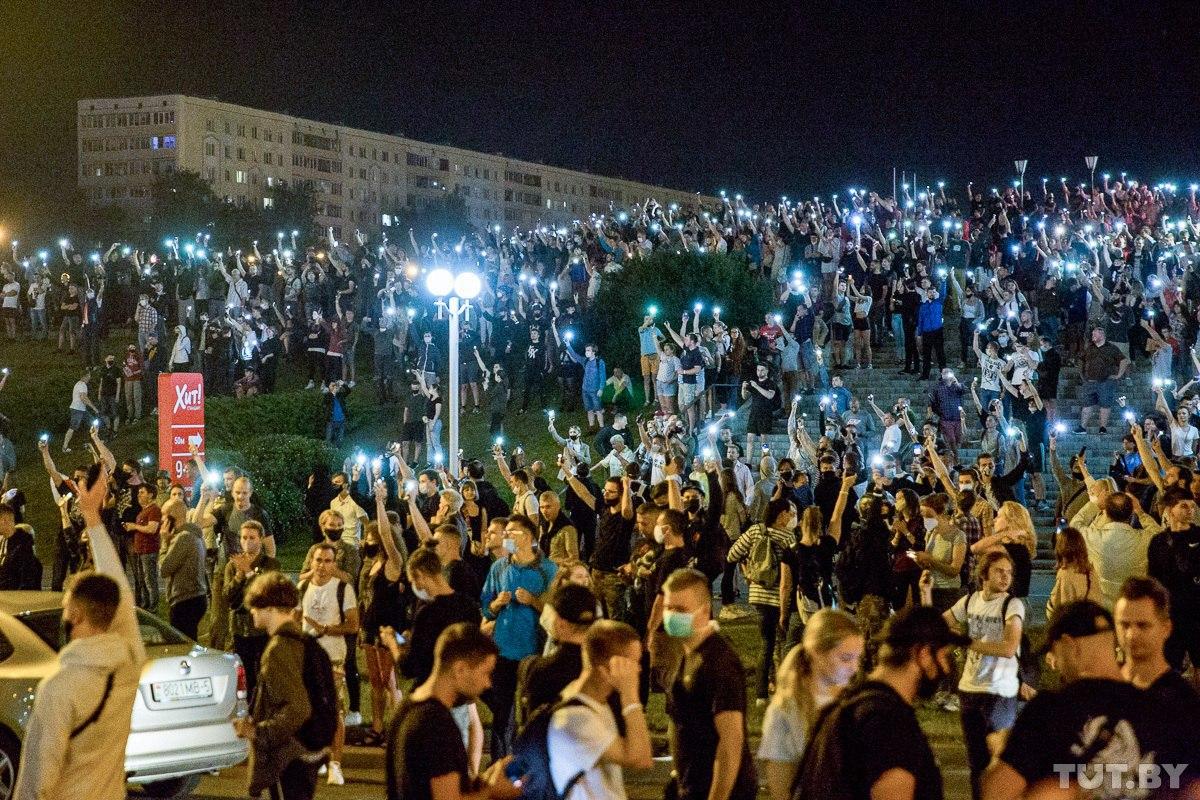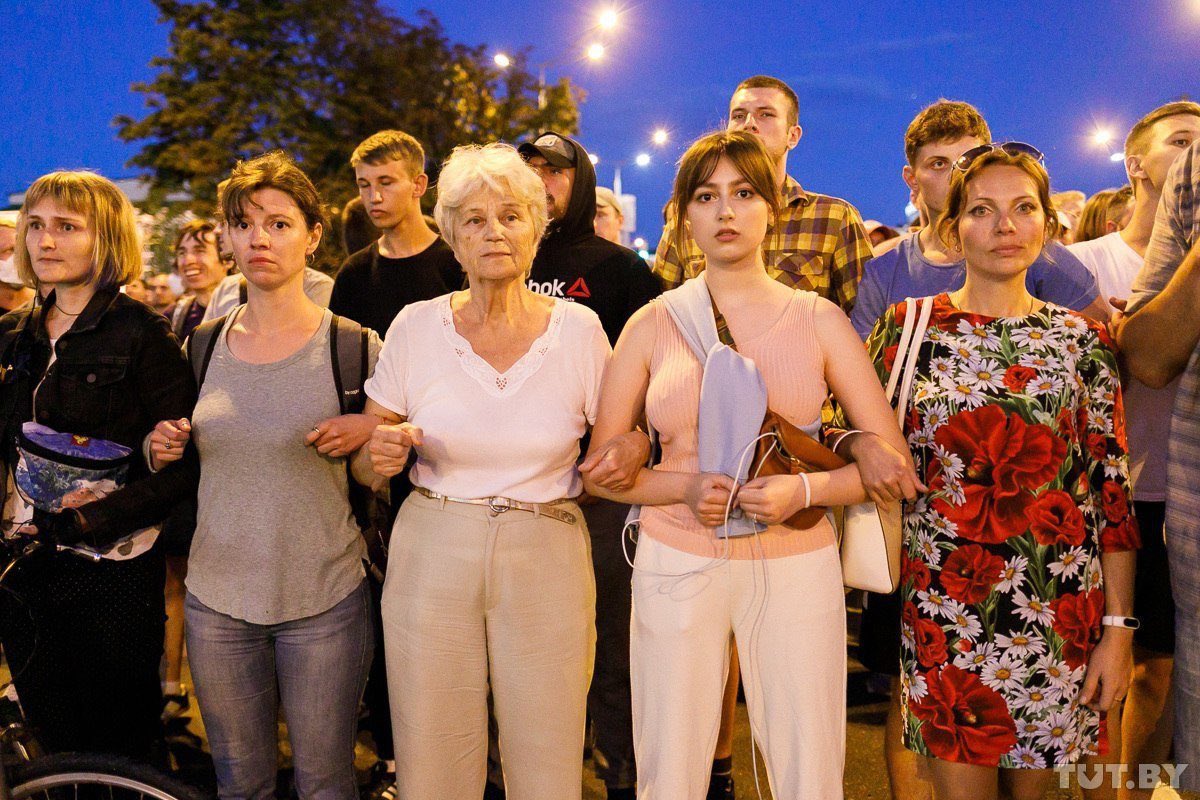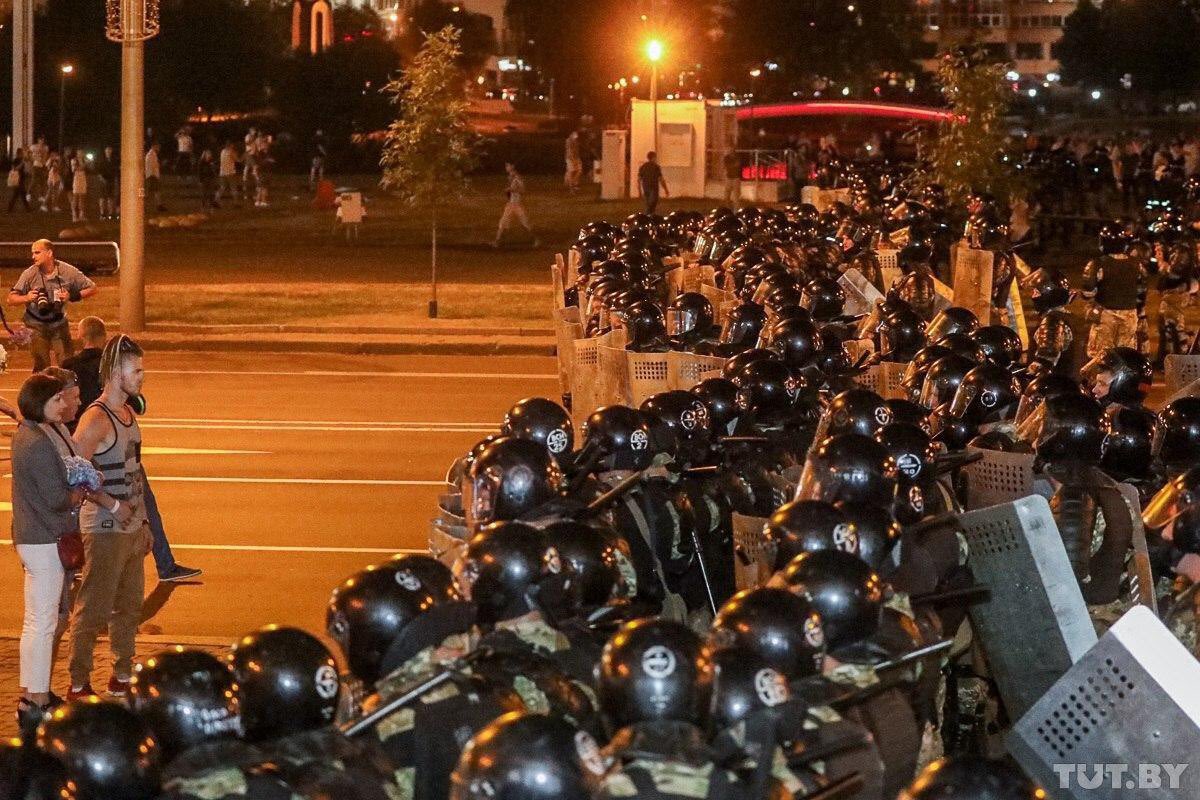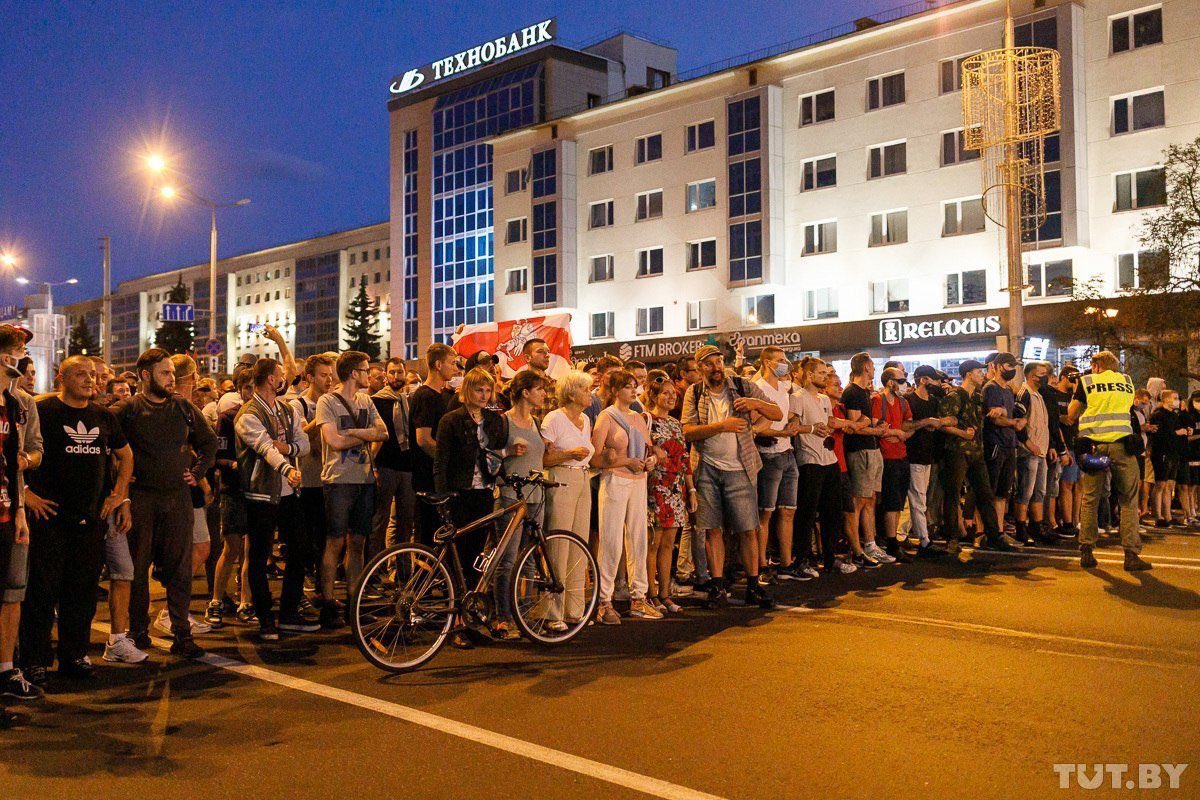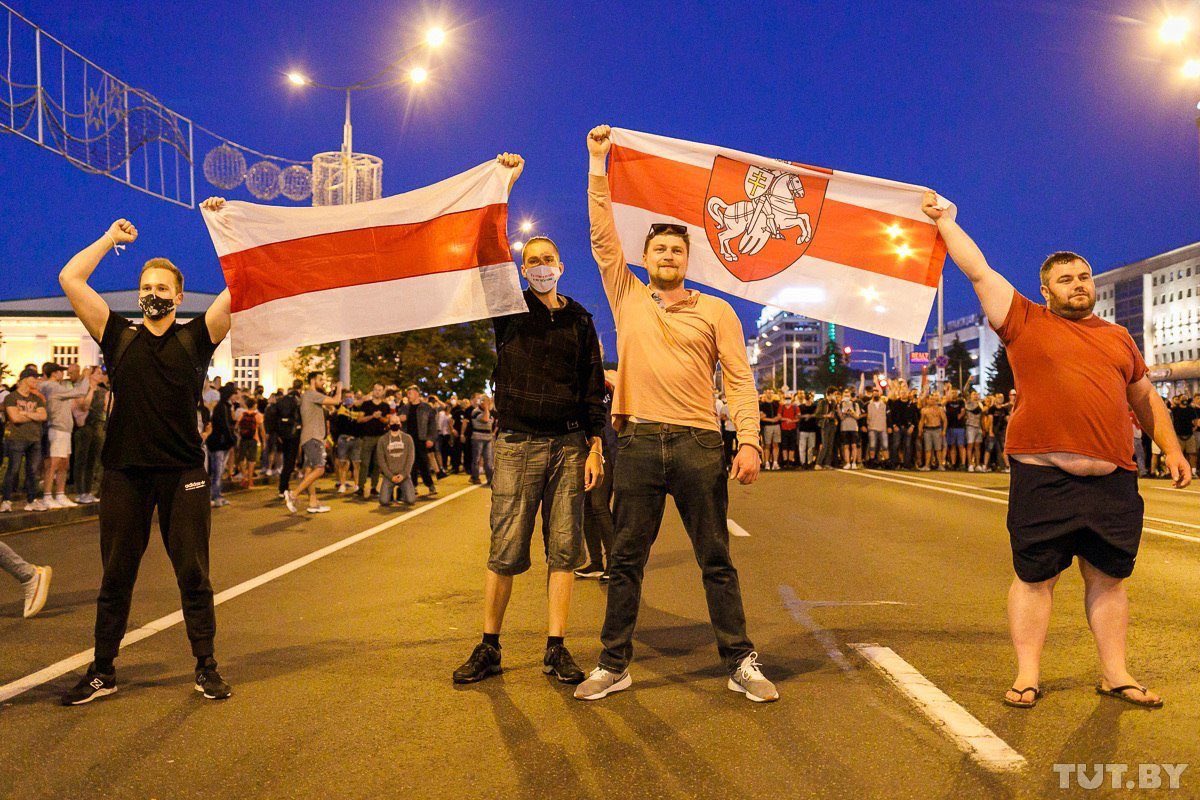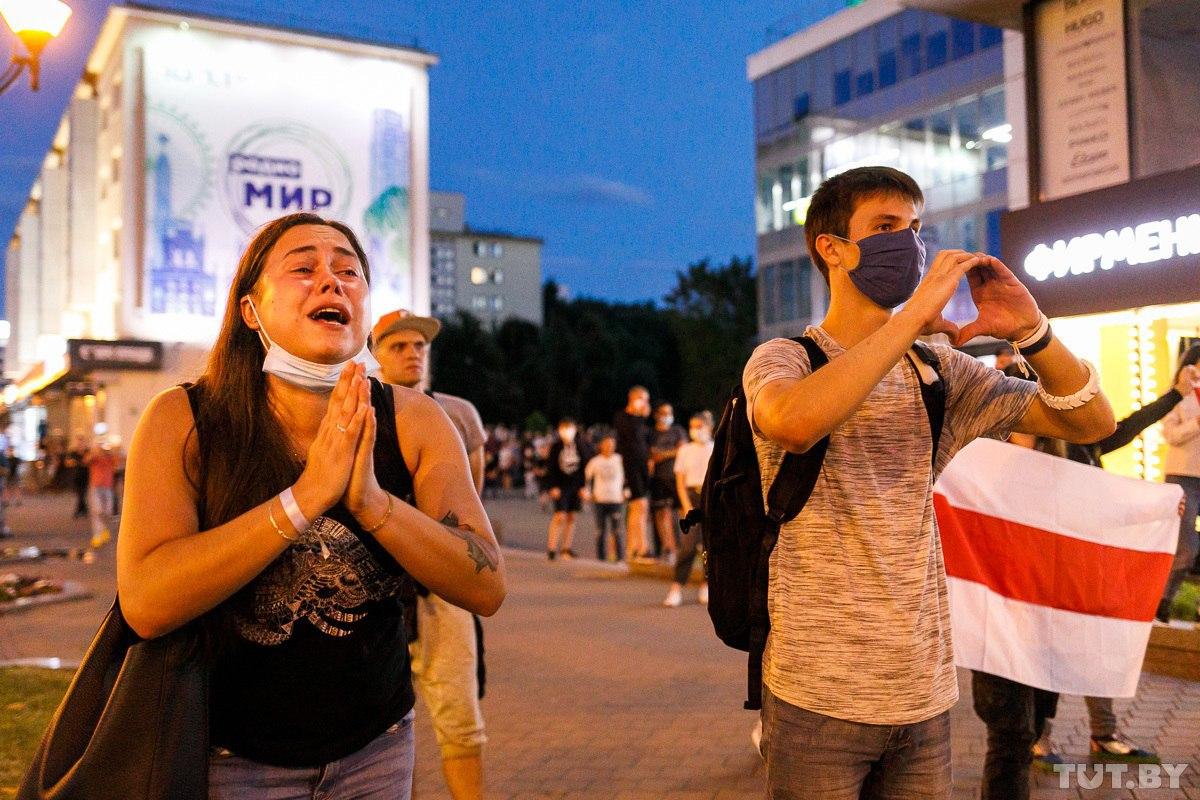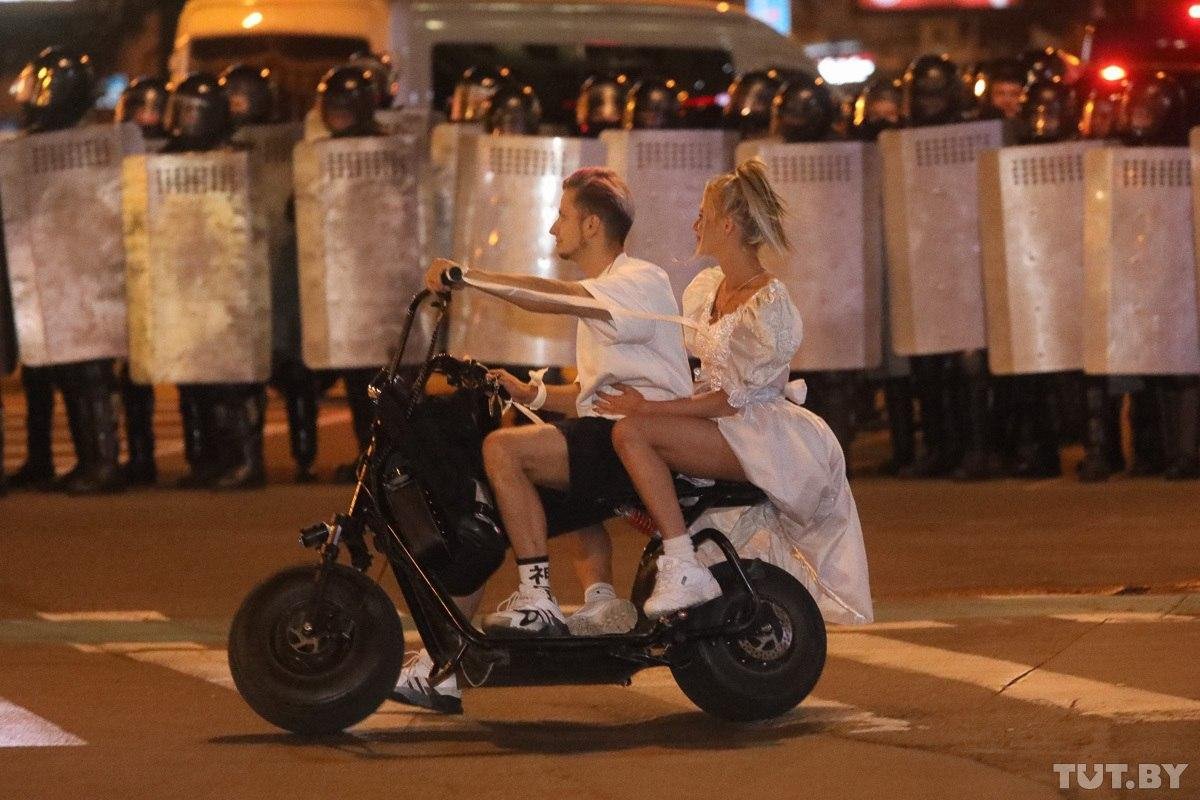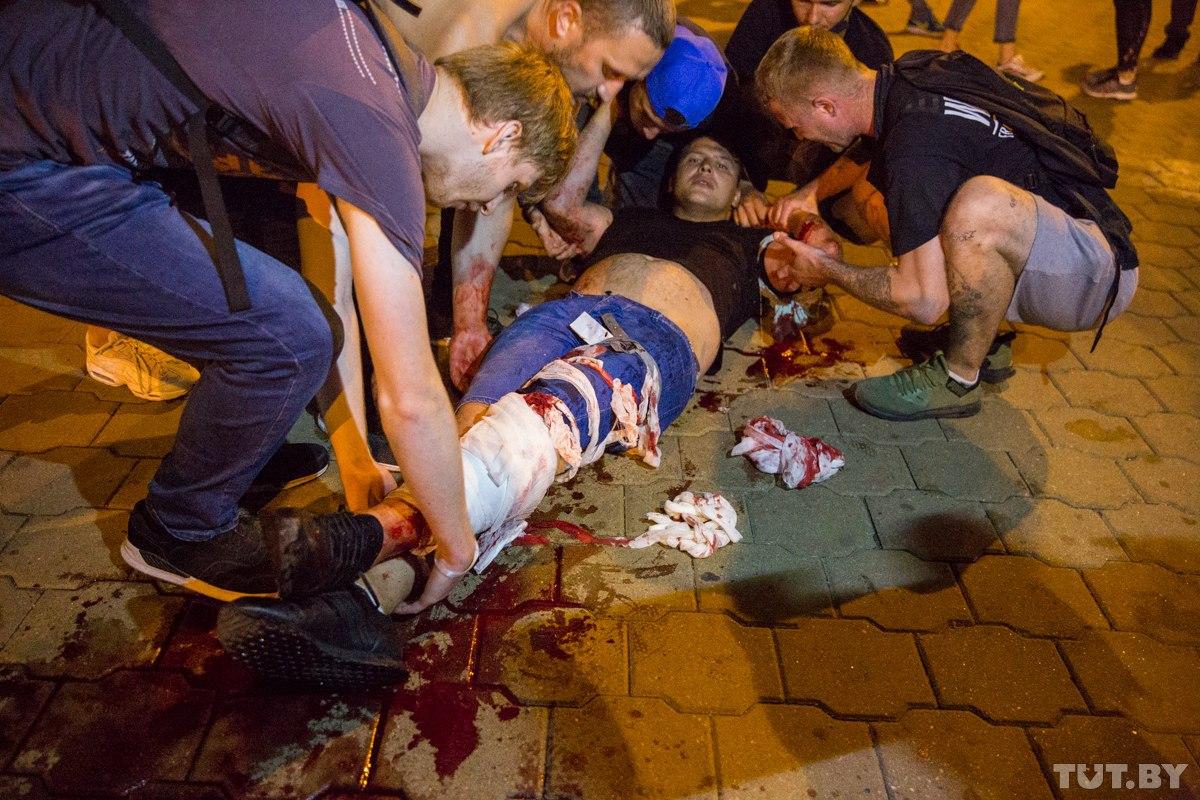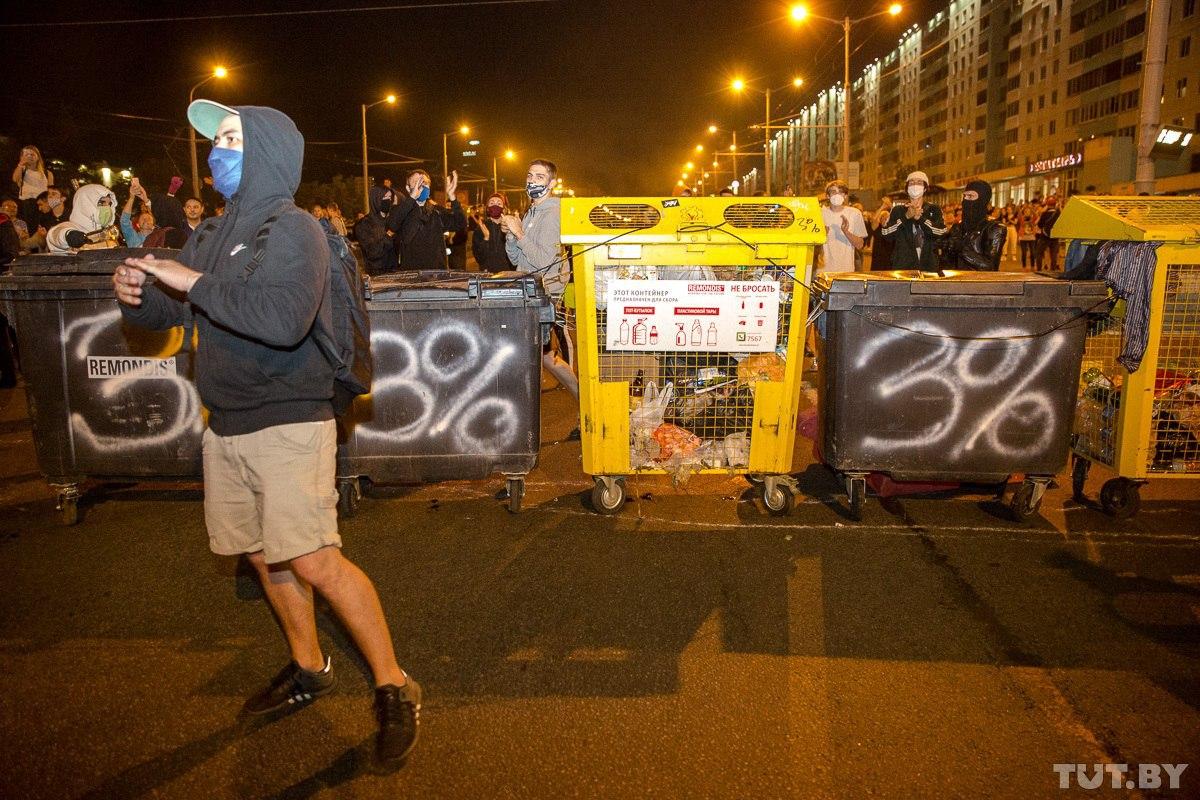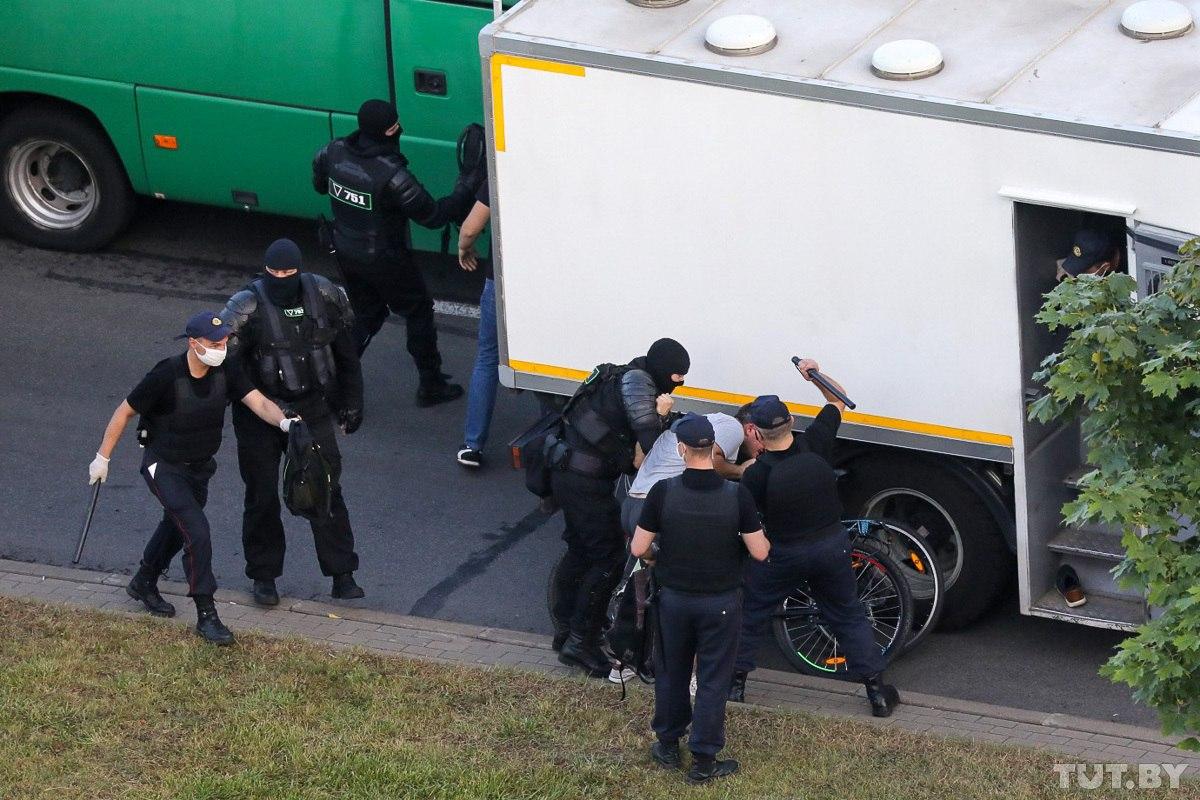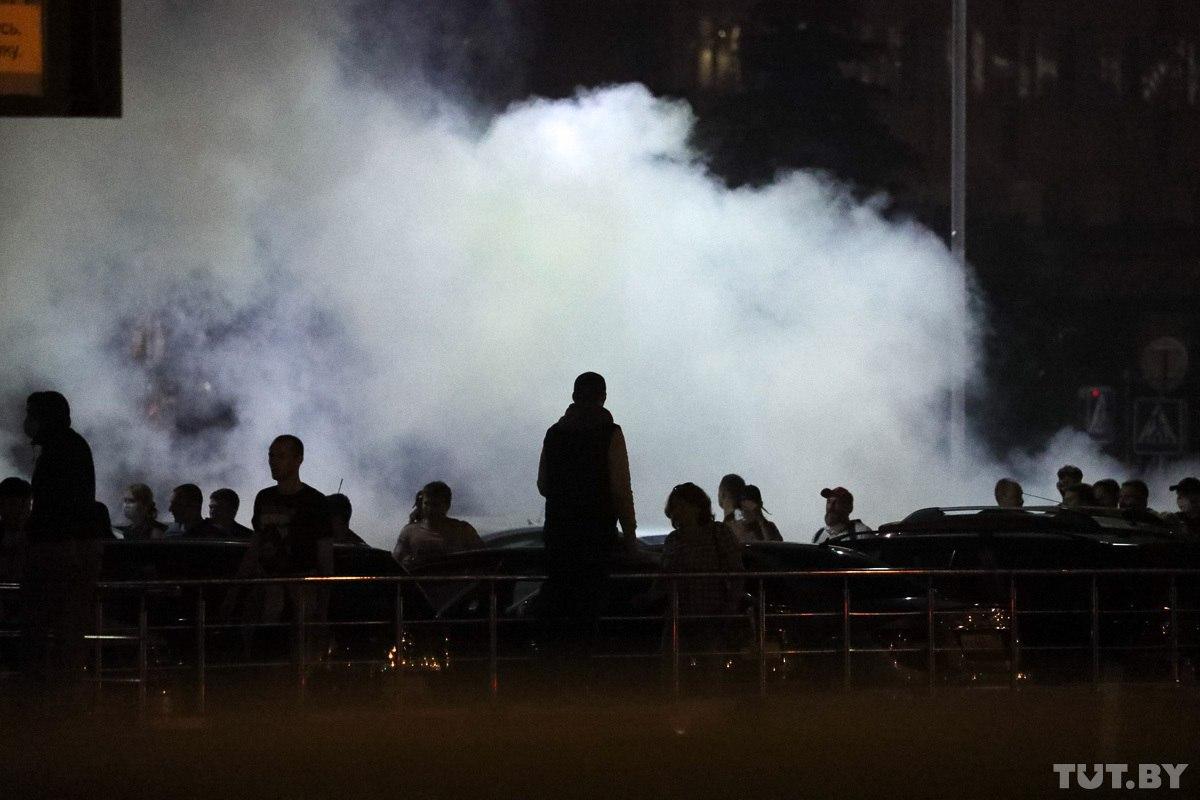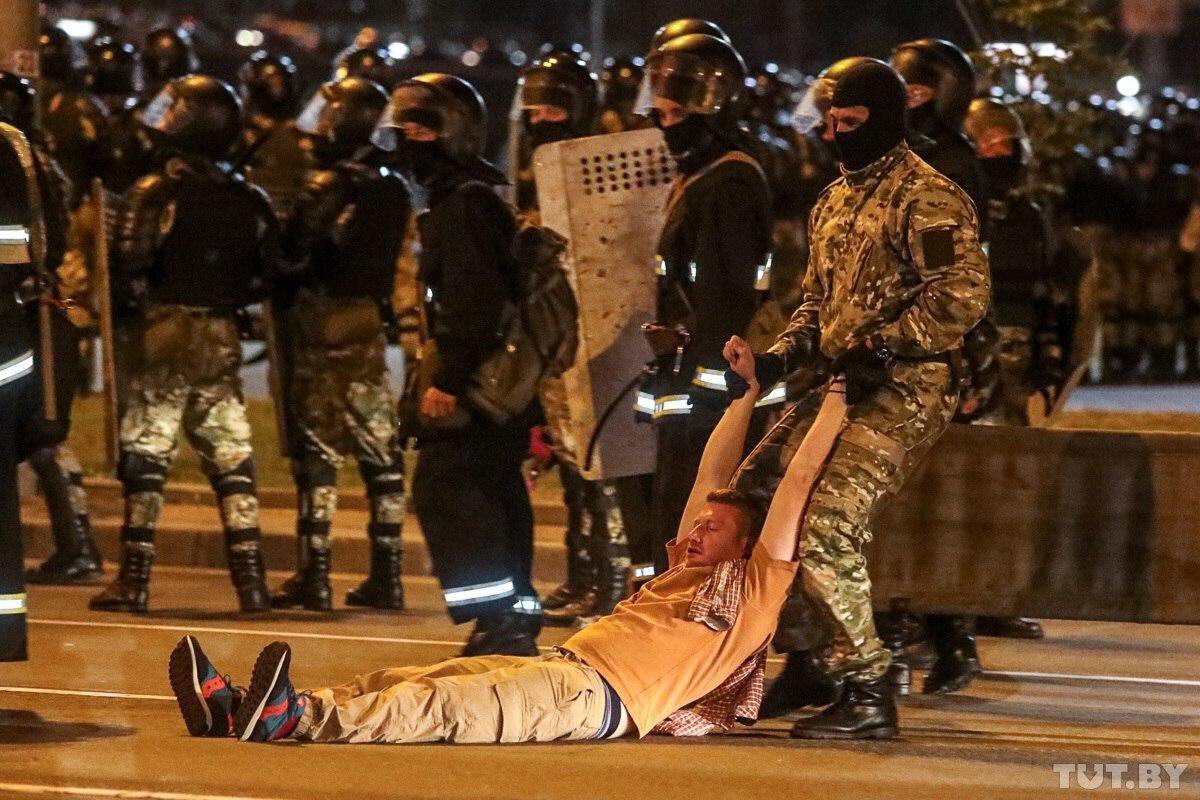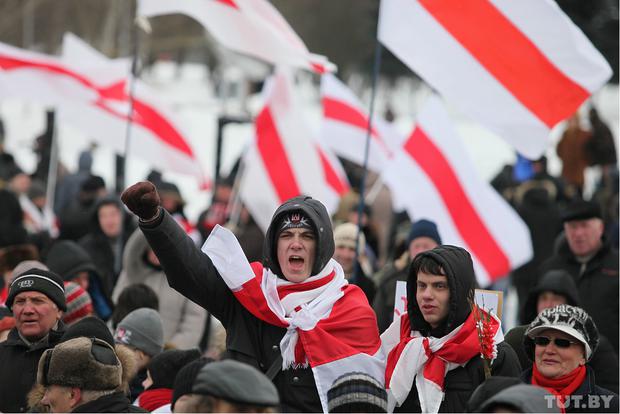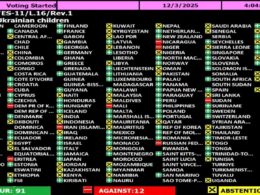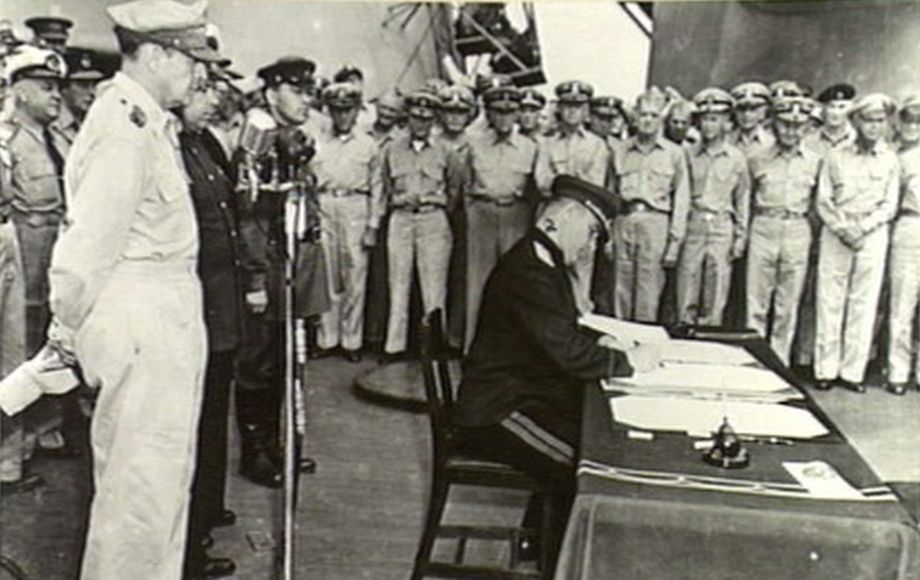On 9 August, in what is called an election in Belarus, incumbent President Alyaksandr Lukashenka officially came out victorious.
According to a preliminary tally by the Central Election commission, he won 80.08% of the votes while his opponent Sviatlana Tsikhanouskaya earned 10.09%, meaning the strongman called "the last dictator of Europe" earned another term in office - his sixth one since 1994.
However, the Belarusian people disagreed. They came out into the streets in protests to support Tsikhanouskaya in unprecedented numbers. The 37-year-old presidential hopeful had gathered stadiums in a pre-election campaign with levels of political engagement that were unusually high for the country.
If previously Belarusians cared little for politics because they felt nothing would change in their repressive dictatorship where the power was seized by one person -- Lukashenka, nicknamed "batska" or "daddy," -- now it seems they will not back down from the promise of change these elections bring.
https://twitter.com/alesherasimenka/status/1292611319695278080
An election designed to be rigged

Lukashenka's three main contenders were either jailed or not registered, like in previous elections. But this time, the wife of one applied to be a candidate instead, and was, remarkably, allowed to participate - likely because the sexist Lukashenka did not believe a woman, let alone a housewife, could be a serious opponent.
- Read more: What you need to know about the unprecedented Belarus presidential election, in a nutshell
He was wrong. Sviatlana Tsikhanovskaya united forces with the campaigns of the two other disenfranchised candidates and soon started gathering record-breaking crowds of up to 70,000, preaching a program consisting of three points: release all the political prisoners, hold a referendum on returning to the 1994 constitution, bringing back checks and balances to the political system, and hold a fresh presidential election within 6 months.
She even managed to get the traditionally pro-Lukashenka siloviki on her side.
Now this is beautiful. Soldiers who were deployed in Minsk ahead of the election post pictures straight from their military trucks with the opposition white-red-white flag! pic.twitter.com/ySO74AEybR
— Tadeusz Giczan (@TadeuszGiczan) August 9, 2020
On election day, there was a massive mobilization of voters, which had likely caused problems of a total turnout over 100% for the central election commission. It had previously declared that a record 41.7% had cast their votes in the 5 days of early voting - which leaves ample space for electoral rigging, as this phase of elections was conducted without any external observation, according to the Viasna human rights center.
Massive people's mobilization all over Belarus. I don't think there's ever been anything like that before, the queues I mean. Earlier this week the election commission stole hundreds of thousands of votes, now people are coming to claim them back pic.twitter.com/x2fgb9Nr3w
— Tadeusz Giczan (@TadeuszGiczan) August 9, 2020
According to Viasna, the election can't be considered fair and democratic because:
- only 0.1% of the members of electoral commissions were members of opposition parties; most of them were from GONGOs;
- groups gathering signatures to register opposition candidates were harassed by the police, some were arrested, as were candidates themselves; candidates were disqualified based on opaque and illegal decisions;
- Lukashenka drew heavily on the administrative and propaganda resources of the power vertical, GONGOs, and media;
- only 11.6% of accredited observers were allowed to actually observe the situation at the polling stations at least some time of the early voting; only 1 of 798 from their initiative could observe them all 5 days of the early voting;
- even in that short period, Viasna observers saw many incidents of forced organized voting of such categories of the population as militarymen, police, state employees, dormitory residents, and inflation of the turnout;
- on election day, observers could not observe voting inside the polling stations or polling at home; they did not have access to lists of voters registered at polling stations;
- in many incidents where observers were present outside the stations, the total turnout exceeded 100%, many of those standing in queues could not vote before voting time, which again indicates that the early voting turnout was inflated;
- Viasna observers and observers from civic initiative were not admitted to observe ballot counting, meaning it was not transparent.
Our viewers provided us with copy of voting results report from closed military polling station. 100% of voters cast ballots, all votes have already been counted: 250 for #Lukashenka, 2 for Kanapatskaya, 0 for #Tikhanouskaya, Cherachan, Dzmitryeu #Belarus #Election2020 #electby https://t.co/bP79AAJnn6
— Belsat in English (@Belsat_Eng) August 9, 2020
Unofficial polls say the victory is Tsikhanouskaya's
76 activists conducted their own exit poll, questioning 85500 voters all over Belarus, with Lukashenka getting 13.7 % and Тsikhanouskaya - 72.1 %, according to the Sovremennya Belarus Telegram channel.
Another exit poll initiative focused on the voting abroad, which was marred by extremely long queues, with embassy employees admitting voters only one at a time, as a result of which the stations closed before many registered voters could vote. Tsikhanouskaya earned 86.90% and Lukashenka - 3.86% of the votes.
Outside #Belarus embassy, #London, #UK, there are about 300 people queuing to vote in today’s presidential #election. The embassy allows in only 20 people per hour (as there is just 1 polling booth), effectively depriving most from ability to vote today: pic.twitter.com/ONrx2gcn4g
— Alex Kokcharov (@AlexKokcharov) August 9, 2020
"We are confident that our presence at many polling stations helped the committees make the right choice about counting the votes," the organizers said.
Yet another exit poll initiative was based on online technology. A group of Belarusian programmers created the "Golos" platform where registered users submitted photos of their ballot. From the nearly 1.2 million users that submitted their votes, over 80% were for Tsikhanouskaya. However, the final results have not been published because of internet blocks in the country, as a result of which voters can't upload the photos.
All voters for Tikhanovskaya agreed to fold the ballot into 4-6 times. So you can see how people voted.
And you can see pic.twitter.com/C1MUEwqf4r
— Franak Viačorka (@franakviacorka) August 9, 2020
Belarusian Telegram channels, the prime method of communication these protests due to their endurance of internet blockages thanks to "anti-censorship tools," as explained by Telegram founder Pavel Durov, and especially the channel of Tsikhanouskaya's campaign, are sharing multiple photos of protocols of vote counts from polling stations that dispel the official narrative, showing Tsikhanouskaya's victory. Protocols presenting Lukashenka's victory are missing the necessary signatures
of commission members, suggesting they are falsified.
Commission members leaving from stations with an "honest" tally are met with public support and cheering, while those presenting protocols showing Lukashenka's (very likely falsified) victory are escorted by the OMON riot police, two telling videos shared in Telegram show.
Some polling stations have done an honest vote count in #BelarusPresidentialElection which shows Tsikhanouskaya's confident victory over incumbent Lukashenka. In some, she scored 4x more votes. Here voters cheer at such a station, chanting "thank you!" https://t.co/uib1AgaJyy pic.twitter.com/VnXHQvF6Sr
— Euromaidan Press (@EuromaidanPress) August 10, 2020
Tsikhanouskaya has appealed the official results, saying she got 70-80% of the votes at the polling stations where there were no falsifications and that she considers herself the winner. She did not join the protests and was determined to defend her victory with legal means, calling upon the law enforcers to stop the violence and the demonstrators to not provoke it. Her HQ informed that they are searching for a dialogue with the authorities. Lukashenka had not made any announcements.
In #Minsk, #Belarus, opposition presidential candidate Sviatlana Tsikhanouskaya goes to a polling station to receive a rock star treatment. The level of support to her is unprecedented for an opposition candidate as she unified the protest sentiment: pic.twitter.com/XGbiuTPBzO
— Alex Kokcharov (@AlexKokcharov) August 9, 2020
An Internet blackout
On the day of the election, the Belarusian internet was hit by a blackout - something Lukashenka explained as being carried out "from abroad" "to cause dissatisfaction among the population."
https://twitter.com/netblocks/status/1292534647491112962
At present, there are still serious problems with Belarusian internet, with Telegram working most stably thanks to the "anti-censorship tools." Other social networks are reportedly down, as are Belarusian independent websites:
Internet Shutdown continues in Belarus. News websites and major social networks are blocked. Here are some circumvention services that worked well:
1. @PsiphonInc . The only tool that really worked
2. Telegram Messenger. For texts not pics.
3. Lantern (Similar to Psiphon)
4. TOR— Franak Viačorka (@franakviacorka) August 10, 2020
https://t.co/1Pti2kfo2U has been blocked in #Belarus, but we continue working. Our website, incl English version, is available abroad. There’ll be ENG updates on Twitter too. Stay tuned! #Election2020 #electby Live broadcast in BEL (sometimes RU )here: https://t.co/4bOkRjNKHJ
— Belsat in English (@Belsat_Eng) August 9, 2020
The shutdown starts closer to the evening when people come out to protest:
https://twitter.com/alesherasimenka/status/1293069253646733312
Protests on 9 August
On the day of the vote, there was a mobilization of riot police and military vehicles were seen in Minsk. Immediately after the polling stations closed and preliminary official results showing Lukashenka's victory were publicized, protests started all over the country.
The protests were not initiated by Tsikhanouskaya, who called only for voters to gather near polling stations and wait for the results of the vote count. At the same time, the popular Telegram channel NEXTA called for peaceful protests in city centers nationwide.
As you could see, thousands of soldiers, policemen on Minsk streets right now. It's like the military parade: we can see water cannons, tanks, armored vehicles, military jeeps. However, it doesn't mean they will be used today. The primary goal is to frighten pic.twitter.com/xgtVI46775
— Franak Viačorka (@franakviacorka) August 9, 2020
The strength of the protests was unprecedented. Thousands of Belarusians came to the streets, with the strongest ones in Minsk.
A huge procession in Minsk, Belarus, protesters shout "Leave!" to strongman Lukashenka, who had served 5 terms in a row as president by rigging elections. Belarusians tell him they won't put up with the 6th#BelarusPresidentialElection#StandWithBelarus pic.twitter.com/6COGdGTXS2
— Euromaidan Press (@EuromaidanPress) August 9, 2020
The strength of the police crackdown that started was also unprecedented. Cordons of shielded riot police accompanied by vans and paddy wagons moved along streets to dispel protesters in Minsk.
A dramatic crackdown is happening this very minute in Minsk #Belarus - a shielded police cordon is advancing on thousands of Belarusians protesting against falsified #BelarusPresidentialElection pic.twitter.com/IVQEU1UvHE
— Euromaidan Press (@EuromaidanPress) August 9, 2020
There is ample evidence that police used water cannons, tear gas, rubber bullets, and flashbang grenades.
Authorities constantly deny the use of special equipment, rubber bullets, and grenades despite many evidences. I hope no one died today. pic.twitter.com/ByeA4SrzKC
— Franak Viačorka (@franakviacorka) August 10, 2020

It is clear from the shells of the grenades that they were produced in the Czech Republic. Answering questions of internet users whether the Czech Republic violated the EU embargo to authoritarian Belarus, the Czech Minister of Foreign Affairs wrote on Twitter that the embargo is observed, but there they could have been sold through the black market or be from old stashes, before 2011 when the embargo was introduced.
However, in smaller cities, the riot police at times sided with the protesters. Public pressure on law enforcers to side with the people is very strong.
In a remarkable scene from Brest, #Belarus where young men protesting rigged #BelarusPresidentialElection brace themselves to stand against the riot police, an elderly gentleman joins the fray and tells the police lads they should be with the people#StandWithBelarus pic.twitter.com/ZUbcqZDWsy
— Euromaidan Press (@EuromaidanPress) August 10, 2020
A national strike on 11 August was announced by the Telegram channels.

1) Release ALL political prisoners
2) Dismiss Yermoshyna (CEC head) and hold NEW presidential and parliamentary elections with equal conditions for all candidates.
A nationwide strike is due to start on 11 August
Protests continued all over Belarus into the early morning.
According to the Ministry of Internal Affairs, 3000 were detained on the first day of protests - approximately 1000 in Minsk and 2000 in the regions; protests took place in 33 cities. One man has died after being run down by a police van in Minsk, Viasna confirmed. On 11 August, Nasha Niva reported that the Internal Ministry has raised the count of detained protesters to 5000.
The Viasna human rights center is keeping a list of those detained; at publication date, it had 616 entries. There were reports of severe injuries of protesters from the flashbang grenades and rubber bullets.
10 August: evolution of protester tactics
During the day, the main metallurgical plant of Belarus in Zhlobino went on partial strike. Calls for a nation-wide strike were spread though the Telegram channels.
In the evening, protesters came out to the streets again, coordinated by the Telegram channels. The Internet was still down.
Crowds are in the streets again, in Minsk and in small towns. No internet, mobile connection works with disruptions. Main central streets are blocked, metro doesn't stop in the center. People gather in small groups even on the outskirts. Police use power and flashbangs grenades. pic.twitter.com/WvpwBqWQgb
— Franak Viačorka (@franakviacorka) August 10, 2020
Alpha spetsnaz troops of the KGB were seen on the streets.
This is NOT a riot police. They are likely elite division of special forces of the Belarus army, something like US Navy seals. if you see them, run away. They shoot without warning.
Photos: @svaboda / @RFERL pic.twitter.com/IjsNOllqSV
— Franak Viačorka (@franakviacorka) August 10, 2020

Protesters started employing new tactics. First, the Telegram channels told people to gather not in the center, where a large police force was deployed, but to walk towards the city center each from their metro station. This served to distract the police and diverge their forces.
Riot police has a busy night in #minsk
Such was a tactic of protesters – to make the police move, because it is more difficult for them.
Unlike yesterday, today there was a remarkable level of coordination of messaging between different bloggers https://t.co/XXQPnBe8bF
— Denis Kazakiewicz (@Den_2042) August 11, 2020
Next, drivers created artificial traffic jams to block passage for police vehicles:
Many streets in Minsk are blocked for police vehicles (paddy wagons, water cannons) - Belarusian drivers came out en Masse, causing artificial traffic jams#BelarusPresidentialElection #StandWithBelarus pic.twitter.com/TSyckWc7jv
— Euromaidan Press (@EuromaidanPress) August 10, 2020
Protesters set up barricades in a Minsk district and rebuilt them several times after the police destroyed them.
"Riga" (nickname of the residential area near the shopping mall) - will become a legendary place after this night. People built barricades here two or three times. The police came, destroyed barricades, and then people made them again. Extraordinary endurance. pic.twitter.com/3SRY5aV9SF
— Franak Viačorka (@franakviacorka) August 11, 2020
There was considerably more violence from the protesters' side, with the first reports of Molotov cocktails being used, and a car ramming into ranks of OMON police. Given that Belarusians are an extremely peaceful people, these episodes of violence testify to their degree of irritation and desperation.
Another video of protesters throwing Molotov cocktails at the police near Spartyunaya metro station in #Minsk, #Belarus: pic.twitter.com/PVcYRerXoM
— Alex Kokcharov (@AlexKokcharov) August 10, 2020
In the regions, OMON behavior has been mixed. There have been reports of riot police officers lowering their shields and warning protesters which places they need to go to avoid arrests; in other places, they were dispersed. The Telegram channels continue to urge protesters to come to the streets.
In some #Belarus regions, OMON sides with protesters; In others Iike Mozyr on the vid, OMON disperses them. "Do not despair, go out again &keep them busy so Lukashenka doesn't pull all OMON to Minsk!" urge popular Telegram channels#BelarusPresidentialElection#StandWithBelarus pic.twitter.com/qfuTAd5tsi
— Euromaidan Press (@EuromaidanPress) August 10, 2020
There was one more death: a bus driver was killed after a police stun grenade exploded next to him.
Altogether, the protests have united people from extremely different strands of life, many of whom were uninterested in politics before.
Journalists targeted and arrested
In the two days of the protests, many journalists went missing, were detained or injured.
Ilya Pitalev, a photo correspondent of the Russian news agency "Rossiya Segodnya," went missing on 10 August at 6 PM. At 2 AM on 11 August, the editor-in-chief of Belarusian daily Nasha Niva, Yegor Martynovych, was detained.
Tatyana Kapitonova, a photojournalist of the Belsat TV channel, received a concussion in Minsk; journalists of the TV channel Alyona Shcherbinskaya and Tatyana Belashova were detained. Journalist Ales Chygir and his wife Danuta were detained in Bobruisk, and journalists Milan Kharitonov and Ales Levchuk - in Brest.
Maksym Sokolov, a journalist of the Meduza news site, was injured; Mihail Fridman, a photo correspondent of Getty Images, was shot at.
Daily Storm correspondents Anton Starkov and Dmitry Lasenko were detained; the founder of the WarGonzo project Semen Pegov ended up in one paddy wagon with them. He is now in a remand prison, while Starkov and Lasenko were released.
Read also:
- What you need to know about the unprecedented Belarus presidential election, in a nutshell
- Russian occupation administrations in Donbas recruit militants for action at Belarusian-Russian border – NGO
- A Russian power scenario during the Belarusian elections?
- Belarus election: why strongman Alyaksandr Lukashenka faces unprecedented resistance
- Confessions of an ex-riot policeman from Belarus
- Russian Wagner mercenaries arrested in Belarus: ‘little green men’ scenario, fighters in transit, or other?
- Belarusian police join #NotMyPresident flashmob amid continued rallies for Lukashenka’s rivals
- Elections in Belarus: Lukashenka’s rival and his son detained on secretive charges
- At least 240 arrested in Belarus protests against barring of opposition candidates (photos, videos)

